Written by: Dušan Komarčević
Source: SlobodnaEvropa.org
"Patriotic action in Belgrade amid deteriorating situation in Kosovo."
Along with that comment, the Russian paramilitary group "Vagner" shared a video of a protest by hundreds of ultra-rightists in Belgrade on its Telegram channel.
As explained at the protest, the gathering was held on the evening of December 12 as a sign of "support for the Serbs" in Kosovo, who erected barricades and blocked roads in the north of that country.
They did this after the arrest of a former member of the Kosovo Police of Serbian nationality, Dejan Pantić, whom the Kosovo authorities suspect of participating in the incident when the office of the local election commission was demolished. Pantić has been in custody since then.
"Russians and Serbs are brothers forever," concludes the announcement of the "Wagner" group, whose members have been fighting on the frontline in Ukraine on the side of Russia since that country launched an invasion on February 24.
The premises recently opened by this paramilitary organization in St. Petersburg were visited by Damjan Knežević, the leader of the informal ultra-right group "Narodna Patrola" from Serbia, at the end of November.
Knežević was among those present at the meeting in Belgrade on Monday evening.
Support of Russian extremists
In addition to "Vagner", Knežević's organization is also connected with the "RUSOV" movement, another Russian extreme right-wing group from Russia, whose members are participating in the invasion of Ukraine.
Andrej Rodionov, the founder of this organization, whose full name is the International Movement "Russian-Slavic Unification and Revival - RUSOV", wrote on his Telegram channel, among other things, that "the Russians will come to the aid of their Serbian brothers" at the moment when "the time really comes for the Serbs to return their holy land of Kosovo and Metohija".
In the same publication, he assessed that the current situation in Kosovo "will not escalate into an armed conflict, but that is only for now".
His announcement was broadcast by Knežević's "Narodna patrola" on its channel.
In the last few years, Rodionov has visited Serbia several times, as well as North Macedonia and Montenegro.
As can be seen on his social networks, in Belgrade in November 2021, together with Damjan Knežević, he marked the 100th anniversary of the exodus of Russian monarchists from Russia after the October Revolution.
Previously, Knežević was a guest of Andrej Rodionov in Moscow last May.
Since the beginning of the war in eastern Ukraine in 2014, the movement led by Rodionov has supported the actions of pro-Russian separatists, and "RUSOV" publishes photos of soldiers wearing the emblem of this organization on their Telegram channel almost every day.
Some of them also have the emblem of the "Wagner" paramilitary mercenary formation on their sleeves, in which individual citizens of Serbia also fought.
After visiting the "Wagner" center in St. Petersburg, Damjan Knežević told Radio Free Europe (RSE) that the goal of his visit was to "ensure support in the event of a conflict in Kosovo."
After the latest tensions in the north of Kosovo, Miša Vacić, leader of the non-parliamentary party Serbian Right, also spoke out. In the night between December 11 and 12, he posted a photo on Twitter showing a group of masked people holding a banner in the center of Belgrade with the message "Hold on, brothers, we'll be down soon, so they can see again what the Serbs are afraid of."
Vacić accompanied the photo with the words:
"Belgrade tonight. In addition to my colleagues from the Serbian Right (from 40 cities), we learn that hundreds of young people are ready to leave for Kosovo, immediately if violence against the people at the barricades begins."
Let us remind you that Vacić also supported the Russian invasion of Ukraine, and as an international observer he followed the referendum for joining Russia, which was held in September 2022 in the seceded and occupied Ukrainian regions.
The dangers of extremist groups
Connections of Russian ultra-right organizations with extremist groups from Serbia, Montenegro and Bosnia and Herzegovina. entities of Republika Srpska date back years, Hikmet Karčić, research associate of the Institute for Research of Crimes Against Humanity and International Law of the University of Sarajevo, reminds RSE.
"It is just one of the forms of Russia's official policy towards Serbia," says Karčić.
He recalls that Russian extremist organizations and individuals provided support to Serbian units during the war in Bosnia and Herzegovina (BiH) from 1992 to 1995.
"So the support of the paramilitary group 'Vagner' and other similar groups in this case represents a great danger," says Karčić.
On the other hand, adds Karčić, local extremist groups are used by the state of Serbia itself as "parastate instruments" for various "dirty jobs".
"Instead of the MUP, the Army or the security services doing such things, there are these extremist groups that are small, mobile, have an ideological background and can perform dirty work for the state, as the so-called paramilitary formations did throughout the entire former Yugoslavia," says Karčić. and underlines:
"These groups may not be numerically large, but they are definitely strong enough to instill fear among the population, but also to initiate processes that may correspond to the state policy of both Russia and Serbia."
RFE/RL sent a query to the Ministry of Internal Affairs (MUP) of Kosovo about whether they had noted the presence of ultra-right groups from Serbia in the north, but by the time the text was concluded, the answer had not arrived.
There were also no answers from the Ministry of Internal Affairs of Serbia, to which RSE sent questions, whether they follow the contacts of Russian and Serbian ultra-rightists and whether they see as a problem the announcement by extremist groups from Serbia that their members are ready to go to the north of Kosovo.
Why was the protest held?
A column of mostly younger people, mostly hidden behind black hoods and 'phantoms', walked from the Temple of Saint Sava to the Church of Saint Mark in Belgrade on December 12.
During the protest walk, the organizers of which remain unknown, nationalist songs were heard, the national flag of Kosovo was burned, and songs were sung in praise of the "eternal" friendship between Serbia and Russia.
Clothing with "anti-antifa" markings, by which members of neo-fascist groups are recognizable, could also be seen on some of those present.
The guy who addressed the crowd wore a black mask and cap and did not introduce himself, explaining that he was "from Kosovo".
In a short speech, he said that they advocate for the entire territory of Kosovo to be under the administration of Serbia.
The event was not overly interesting to the mainstream media, but it was reported in detail by the far-right Telegram channel.
Reporting on Telegram
The call for the protest itself was published on December 11 on the "Hrabro za Kosmet" channel, which has slightly more than 2,000 followers. The call was shared by channels with a much larger audience, such as the "Rebellion is a state of mind" channel.
This channel, which has 67,000 followers, published several videos from the Belgrade protest, and one of those videos was transmitted by the already mentioned "Vagner".
The same call was broadcast by the channel of the clerofascist organization "Obraz", whose work was banned by the Constitutional Court of Serbia in 2012.
Videos from the protest were also published by the "Evil Eagles" channel, which is run by the organization "Russian-Serbian Center Eagles" from St. Petersburg. In August, the Prosecutor's Office for High-Tech Crime of Serbia opened a case due to the threats sent to anti-war activists in Serbia from this Telegram group.
The Prosecutor's Office for RSE did not answer the question at which stage this case is, but that they will inform the public about "decisions made when the conditions provided for by law are met".
Politicians at a protest
The right-wing Dveri party, one of the opposition parties in the Serbian parliament, announced on Twitter that its MP Borko Pušić was at the Belgrade protest in support of the Serbs from Kosovo.
The vice-president of this party, Ivan Kostić, previously stated on December 12 that he expects official Belgrade to, in accordance with the diplomatic agreement signed with the Ministry of Foreign Affairs of Russia, officially request Russia's help and involvement regarding the protection of Serbs in Kosovo and the territorial integrity of Serbia.
"We believe that the time has come for Serbian President Aleksandar Vučić and Minister Ivica Dacić to finally do something when it comes to the possibilities of Russia's engagement in international negotiations in which representatives of the USA and the European Union participate, and who almost always defend the interests of the Albanian side," he said. Kostić.
The agreement between Serbia and Russia was signed in September by the heads of diplomacy of the two countries - Nikola Selaković (who was replaced by Ivica Dacić in the new Government of Serbia) and Sergej Lavrov.
Serbia signed this agreement in the midst of Russian aggression against Ukraine, while Russia is affected by the sanctions of the western part of the international community.
Because of this, the document caused stormy reactions, and some European representatives said that, because of this, they should consider freezing the accession negotiations with Serbia.
Controlled chaos
According to Hikmet Karčić, it is up to Russia to maintain its influence in the Western Balkans with as few invested resources as possible.
"Through the organized conflicts in Kosovo, Moscow could divert its focus from the events in Ukraine and create several focal points in a small area such as the Western Balkans - from Kosovo, through Montenegro, Bosnia and Herzegovina, to North Macedonia. These are all locations where The Kremlin had its influence," Karčić believes.
Extremist groups can very well serve to cause such controlled chaos, concludes Hikmet Karčić.
What is happening in the north of Kosovo?
Roads in the north of Kosovo, where most members of the Serbian community live, have been blocked for days.
Groups of citizens began erecting barricades on December 10, when the authorities in Kosovo arrested former Serbian policeman Dejan Pantić.
The court in Pristina made a decision to order Pantić, a former member of the Kosovo Police, into custody for one month. He is accused of "organizing a terrorist attack on the premises of the Central Election Commission".
Serbian President Aleksandar Vučić announced that on December 15, the Government of Serbia will send a request to the KFOR commander for the return of up to 1,000 members of the security forces to Kosovo.
Official Brussels invited Pristina and Belgrade to return to dialogue.
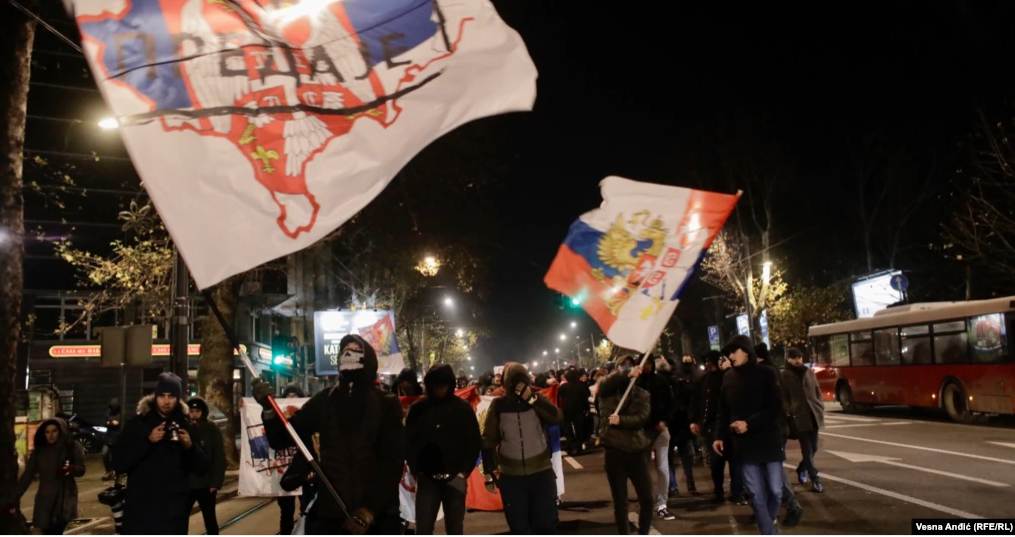
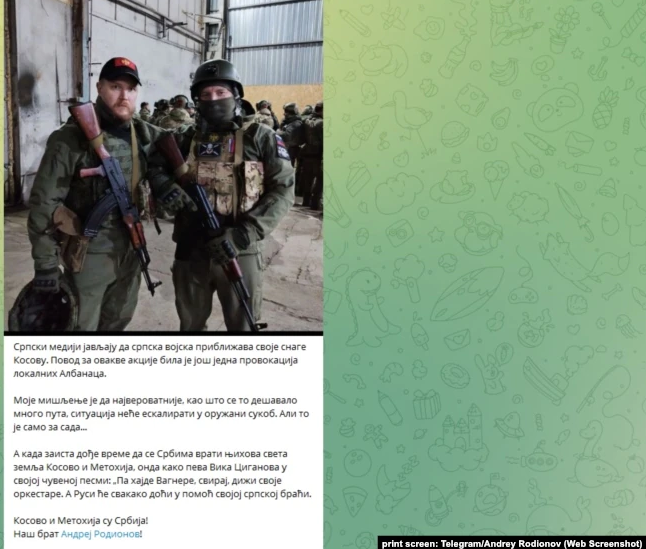
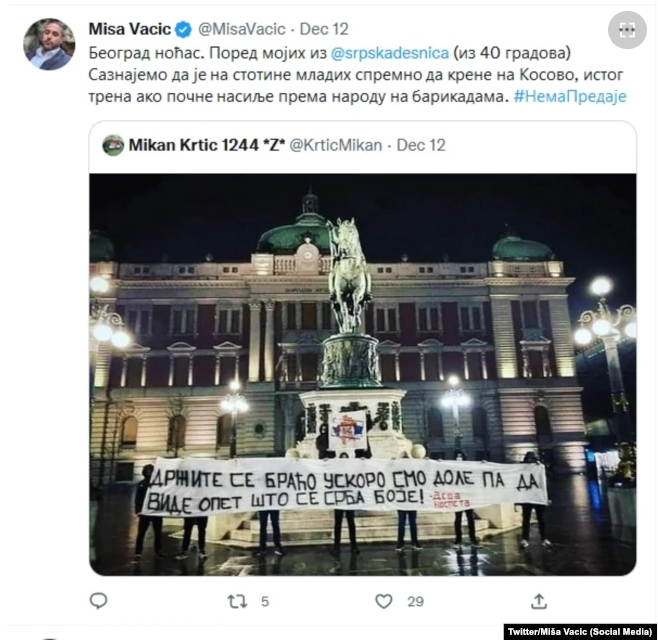
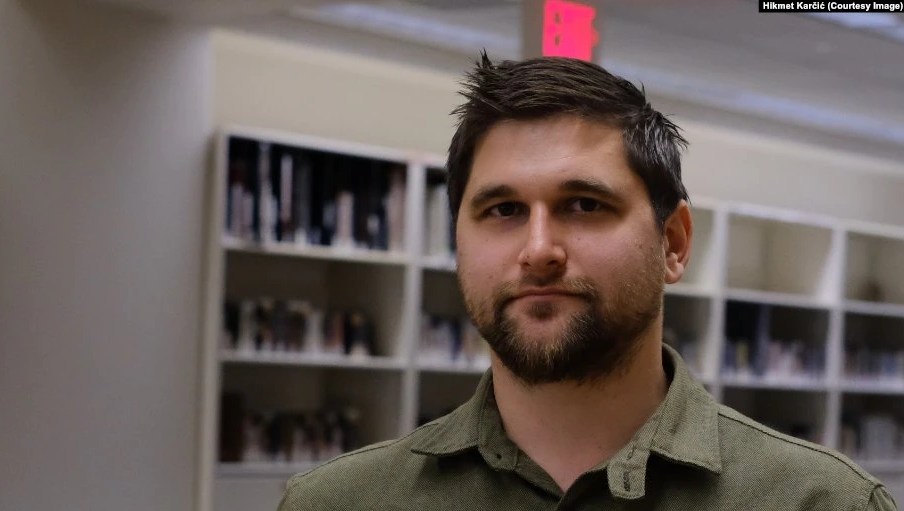
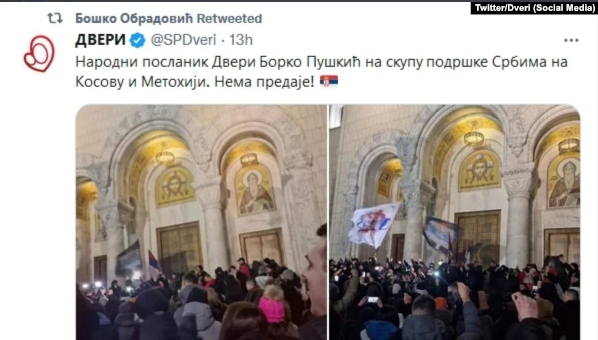
(1).png)
(1).png)